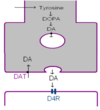Lecture - Neurodevelopmental psychiatry Flashcards
Give two psychiatric childhood conditions which have a strong environmental component. What about those with a strong biological component?
Environmental:
- Oppositional defiant disorder
- Conduct Disorder
Biological:
- ADHD
- Autism
- Psychosis
How do we know that some psychiatric conditions are largely genetic?

- Family studies - relatives of affected individuals vs controls BUT this doesn’t get rid of environmental factors
- Adoption studies - e.g. take adopted children with a disorder and examine rate of disorder in biological vs adopted parents.
-
Twin studies – Calculate correlation between twin pairs, and compare results for MZ vs DZ twins. Can estimate contribution of:
- Genes (illustrated by “heritability” concept)
- Shared environment
- Non-shared environment
What is the heritability of autism, ADHD and schizophrenia?
Autism – 90%
ADHD – 60-90%
Schizophrenia – 80%
Therefore, they are neurodevelopmental conditions as there is much evidence into biological risk factors for these conditions.
What is the triad of ADHD?
Impulsivity
Inattention
Hyperactivity
What is the ICD-10 criteria for ADHD?
- >6 months
- Inattention +/- hyperactivity-impulsivity
- Pervasive across different situations
- Onset <7 years - e.g. milestone delays
- Significant distress or social impairment
How common is ADHD? Who is ADHD more common in?
- 1% hyperkinetic disorder
- 5% ADHD
- M>F 3:1
What comorbidities may occur in ADHD?
Comobidities may occur:
- Oppositional defiant disorder 50%
- Conduct disorder 25%
- Anxiety 25%
- Depressive disorders 15%
- Learning difficulties 30% including reading difficulties
- Soft neurological signs
What is the ADHD spiral?
ADHD symptoms may cause learning difficulties and oppositional beahviour
—> failure at school academically and socially
low self-esteem, isolation and delinquent peer group
—> ADHD symptom…. etc etc

What is the FH association with ADHD?
20% of children with ADHD have parents reporting childhood hyperactivity
Biological parents of adopted-away child with ADHA have higher frequenct of childhood hyperactivity and current antisocial traits, alcohol, poor attention.
Concordance rate are 80% in monozygotic twins, 30% in DZ
What is the underlying cause of ADHD in terms of candidate proteins/genes?
?Underfunctioning of dopamine system - DRD4 receptor and DAT1 transporter
?Deficit in prefrontal cortex - responsible for executive function (EF); ‘top-down’ control of behaviour … (i.e. the things that kids with ADHD have difficulty in)
- planning & flexible strategy
- impulse control
- orient to salient stimuli & adjust action
- suppress inappropriate actions in favour of appropriate ones

What evidence is there that the prefrontal cortex may be implicated in ADHD?
Prefontal Cortex dysfunction in ADHD
- MRI: reduced size
- Functional Imaging: reduced blood flow
Poor performance on EF tasks in ADHD
- Wisconsin Card Sorting Test
- Stroop - tests distractibility by other stimuli
What does the Stroop test involve? What would you expect to find in normal vs AHDH brain?
If you have ADHD there will be a large discrepancy between the first and second list of words as there would be a major struggle to ignore the distarction in the first list (i.e. incongruence)

What are the non-genetic biological aetiologies of ADHD?
- Prematurity
- Very low birth weight
- Foetal alcohol syndrome
- Association between some food additives and childhood hyperactivity - although they may cause hyperactivity it is not necesarily ADHD.
What parental factors may be associated with ADHD in a child?
- Parental high criticism/ maltreatment/ physical discipline
- Low sensitivity to child’s needs
- Maternal depression
But not sure what is causing what… ADHD could be affecting parental responses or genes could be causing both parental and child ADHD.
Research on Romanian orphans: lack of social boundaries and of specific attachments could cause ADHD-type symptoms.
What is the management of ADHD?
- Cognitive assessment
- Pscyho-education - explain that disorder which is no-one’s fault, give info leaflets, support groups
- Diet - individual sensitivities may be present
- Parental skills training - individual or group (e.g. Webster Stratton)
-
Medication - readdresses prefrontal underactivity
- Stimulants e.g. methyphenidate (‘Ritalin’) , immediate or sustained release, block pre-synaptic DAT + agonist at postsynaptic DrD4
- Non-stimulants e.g. atomoxetine (noradrenaline reuptake inhibitor)
- SE include: effects on height, weight, sleep and mood



